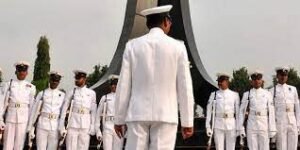Eight ex-Indian naval officers have been sentenced to death by a Qatari court. They were arrested in August last year on charges of espionage. As it is an espionage charge, no details have been released in full. According to the leaked information, they are accused of spying for Israel.
The eight ex-Indian Navy officers who have been sentenced to death had worked for Al Dara Global Technologies and Consultancy Services, a private firm providing security services, after retirement. Run by Khamis Al-Ajmi, an Omani who retired as a squadron leader in the Royal Oman Air Force, the company provided training and maintenance services to the Qatari Navy.
Captain Navjeet Singh Gill, Captain Virendra Kumar Verma, Captain Cheurav Vasisht, Commander Amit Nagpal, Commander Purnendu Tiwari, Commander Sukhunagar Bhakala, Commander Sanjeev Gupta, Navy veteran Rakesh Gopakumar, who have been sentenced to death, are eight people who have been working for Tara Global for more than four years. Along with the eight Indians arrested, Khamis Al-Ajmi, who ran the company, was also arrested, but he was released without charge last November.
Realizing that discussing the background of the case could harm the interests of the eight, the Indian Foreign Office’s request to approach the issue without emotion is justified. This can be discussed considering that we cannot directly interfere in the judicial system of another country.
Tara Global was overseeing a secret plan to integrate Italian submarines into Qatar’s navy. It may be alleged that the details were shared with a foreign country as it is natural for other countries to be interested in knowing the technical features of those advanced submarines.
Although Indians have been convicted of many crimes abroad in the past, including murder, robbery and drug smuggling, rarely have they been charged with espionage. While Kulbhushan Yadav is awaiting execution in a Pakistan jail on espionage charges, this is the first time eight Indians have been hanged for espionage in an ally.
Options available for India
India can help the eight people appeal in Qatar, but cannot appeal to the International Court of Justice like the Kulbhushan Yadav case. The activities of those officials who worked in a private company were not constitutional malpractices. Their arrest, investigation, imprisonment, etc. have been done properly.
They cannot apologize. If they apologize, it becomes an admission of guilt. India’s only option in this matter is to approach the Qatari government diplomatically and find an amicable solution.
India and Qatar have very close diplomatic relations. Prime Minister Manmohan Singh in 2008 and Prime Minister Narendra Modi in 2016 paid state visits to Qatar, while in March 2015 the Emir of Qatar, Sheikh Tamim bin Hamad Al Thani, visited India. Qatari civil servants are trained in India. A defense cooperation agreement is in place between the two countries.
India’s import share accounts for 80% of the $15 billion trade between the two countries. 42% of our gas demand comes from Qatar. India also plays an important role in Qatar’s imports.
Eight lakh Indian doctors work in Qatar with a population of 2.7 lakh. Indians work there to the extent of a quarter of the population. There are many people who are closely connected with the government of that country as businessmen and business leaders.
It is up to Prime Minister Narendra Modi to channel the convicts’ appeals and, failing that, use his closeness to the Qatari emir to save them from the death penalty. If Amir is willing, he can forgive them and release them!
the officers family are waiting for the Indian government response and will there relation will save from the do or die situation and return to the prison. It is the final hope












